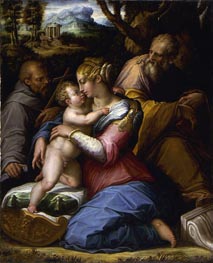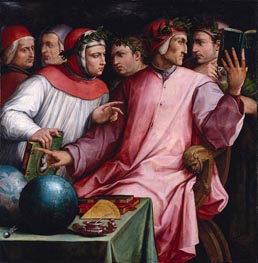
Giorgio Vasari Painting Reproductions 1 of 1
1511-1574
Italian Mannerist Painter
Giorgio Vasari (July 3, 1511 - June 27, 1574) was an Italian painter and architect, known for his famous biographies of Italian artists.
Biography
Vasari was born in Arezzo, Tuscany. At the recommendation by his cousin Luca Signorelli, at an early age he became a pupil of Guglielmo da Marsiglia, a skillful painter of stained glass. At the age of 16, Cardinal Silvio Passerini sent him to study in Florence, in the circle of Andrea del Sarto and his pupils Rosso Fiorentino and Jacopo Pontormo. His humanist education was not ignored, and he met and knew Michelangelo, whose painting style influenced Vasari's.
In 1529 he visited Rome and studied the works of Raphael and others of the Roman High Renaissance. Vasari's own Mannerist paintings were more admired in his lifetime than afterwards. He was consistently employed by patrons in the Medici family in Florence and Rome, and he worked in Naples, Arezzo and other places. Many of his pictures still exist, the most important being the wall and ceiling paintings in the great hall of the Palazzo Vecchio in Florence, and his uncompleted frescoes inside the vast dome of the Duomo, completed by Federigo Zuccaro. He also helped organize the decoration of the Studiolo, now reassembled in the Palazzo Vecchio.
As an architect he was perhaps more successful. The loggia of the Palazzo degli Uffizi by the Arno opens up the vista at the far end of its long narrow courtyard, a unique piece of urbanistic planning that functions as a public piazza, and which, if one considered it as a short street, is the unique Renaissance street with a unified architectural treatment. In Florence Vasari also built the long passage connecting the Uffizi with the Pitti Palace, through arcading across the Ponte Vecchio. Unhappily he did much to injure the fine medieval churches of Santa Maria Novella and Santa Croce, from both of which he removed the original rood screen and loft, and remodelled the retro-choir in the Mannerist taste of his time.
In Rome, Vasari worked with Giacomo Barozzi da Vignola and Bartolomeo Ammanati at Pope Julius III's Villa Giulia.
Vasari enjoyed a high repute during his lifetime and amassed a considerable fortune. In 1547 he built himself a fine house in Arezzo (now a museum honoring him), and spent much labour in decorating its walls and vaults with paintings. He was elected one of the municipal council or priori of his native town, and finally rose to the supreme office of gonfaloniere.
In 1563 he founded the Accademia del Disegno at Florence, with the Grand Duke and Michelangelo as capi of the institution and 36 artists chosen for members.
Vasari died at Florence on June 27, 1574.
Biography
Vasari was born in Arezzo, Tuscany. At the recommendation by his cousin Luca Signorelli, at an early age he became a pupil of Guglielmo da Marsiglia, a skillful painter of stained glass. At the age of 16, Cardinal Silvio Passerini sent him to study in Florence, in the circle of Andrea del Sarto and his pupils Rosso Fiorentino and Jacopo Pontormo. His humanist education was not ignored, and he met and knew Michelangelo, whose painting style influenced Vasari's.
In 1529 he visited Rome and studied the works of Raphael and others of the Roman High Renaissance. Vasari's own Mannerist paintings were more admired in his lifetime than afterwards. He was consistently employed by patrons in the Medici family in Florence and Rome, and he worked in Naples, Arezzo and other places. Many of his pictures still exist, the most important being the wall and ceiling paintings in the great hall of the Palazzo Vecchio in Florence, and his uncompleted frescoes inside the vast dome of the Duomo, completed by Federigo Zuccaro. He also helped organize the decoration of the Studiolo, now reassembled in the Palazzo Vecchio.
As an architect he was perhaps more successful. The loggia of the Palazzo degli Uffizi by the Arno opens up the vista at the far end of its long narrow courtyard, a unique piece of urbanistic planning that functions as a public piazza, and which, if one considered it as a short street, is the unique Renaissance street with a unified architectural treatment. In Florence Vasari also built the long passage connecting the Uffizi with the Pitti Palace, through arcading across the Ponte Vecchio. Unhappily he did much to injure the fine medieval churches of Santa Maria Novella and Santa Croce, from both of which he removed the original rood screen and loft, and remodelled the retro-choir in the Mannerist taste of his time.
In Rome, Vasari worked with Giacomo Barozzi da Vignola and Bartolomeo Ammanati at Pope Julius III's Villa Giulia.
Vasari enjoyed a high repute during his lifetime and amassed a considerable fortune. In 1547 he built himself a fine house in Arezzo (now a museum honoring him), and spent much labour in decorating its walls and vaults with paintings. He was elected one of the municipal council or priori of his native town, and finally rose to the supreme office of gonfaloniere.
In 1563 he founded the Accademia del Disegno at Florence, with the Grand Duke and Michelangelo as capi of the institution and 36 artists chosen for members.
Vasari died at Florence on June 27, 1574.
2 Giorgio Vasari Paintings

Holy Family with Saint Francis in a Landscape 1542
Oil Painting
$6398
$6398
SKU: GVA-4659
Giorgio Vasari
Original Size: unknown
Los Angeles County Museum of Art, California, USA
Giorgio Vasari
Original Size: unknown
Los Angeles County Museum of Art, California, USA

Portrait of Six Tuscan Poets 1544
Oil Painting
$7171
$7171
Canvas Print
$92.38
$92.38
SKU: GVA-4660
Giorgio Vasari
Original Size: 132 x 131 cm
Minneapolis Institute of Arts, Minnesota, USA
Giorgio Vasari
Original Size: 132 x 131 cm
Minneapolis Institute of Arts, Minnesota, USA